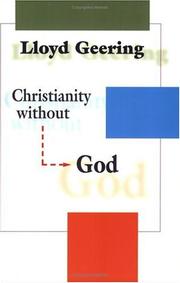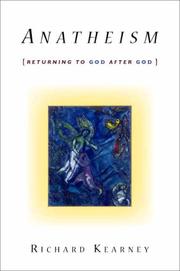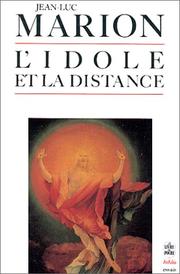| Listing 1 - 10 of 123 | << page >> |
Sort by
|
Book
Year: 1966 Publisher: Utrecht: Ambo,
Abstract | Keywords | Export | Availability | Bookmark
 Loading...
Loading...Choose an application
- Reference Manager
- EndNote
- RefWorks (Direct export to RefWorks)
Book
Year: 1967 Publisher: London : Collins,
Abstract | Keywords | Export | Availability | Bookmark
 Loading...
Loading...Choose an application
- Reference Manager
- EndNote
- RefWorks (Direct export to RefWorks)
Book
Year: 1967 Publisher: Philadelphia: Westminster Press,
Abstract | Keywords | Export | Availability | Bookmark
 Loading...
Loading...Choose an application
- Reference Manager
- EndNote
- RefWorks (Direct export to RefWorks)
Book
ISBN: 9780231147897 Year: 2011 Publisher: New York Columbia university press
Abstract | Keywords | Export | Availability | Bookmark
 Loading...
Loading...Choose an application
- Reference Manager
- EndNote
- RefWorks (Direct export to RefWorks)
God --- Death of God

ISBN: 0944344925 Year: 2002 Publisher: Santa Rosa Polebridge Press
Abstract | Keywords | Export | Availability | Bookmark
 Loading...
Loading...Choose an application
- Reference Manager
- EndNote
- RefWorks (Direct export to RefWorks)
Book
ISBN: 3530184004 Year: 1971 Publisher: Olten Walter
Abstract | Keywords | Export | Availability | Bookmark
 Loading...
Loading...Choose an application
- Reference Manager
- EndNote
- RefWorks (Direct export to RefWorks)

ISBN: 9780231147880 Year: 2010 Publisher: New York Columbia university press
Abstract | Keywords | Export | Availability | Bookmark
 Loading...
Loading...Choose an application
- Reference Manager
- EndNote
- RefWorks (Direct export to RefWorks)
Death of God --- God
Book
ISBN: 1438450478 9781438450476 9781438450452 1438450451 Year: 2014 Publisher: Albany
Abstract | Keywords | Export | Availability | Bookmark
 Loading...
Loading...Choose an application
- Reference Manager
- EndNote
- RefWorks (Direct export to RefWorks)
In 1966, an infamous Time magazine cover asked "Is God Dead?" and brought the ideas of theologians William Hamilton and Thomas J. J. Altizer to the wider public. In the years that followed, both men suffered professionally and there was no notable increase to the small number of thinkers considered death of God theologians. Meanwhile, Christian fundamentalism staged a striking comeback in the United States. Yet, death of God, or radical, theology has had an ongoing influence on contemporary theology and philosophy. Contributors to this book explore the origins, influence, and legacy of radical theology and go on to take it in new directions. In a time when fundamentalism is the greatest religious temptation, this volume makes the case for the necessity of resurrecting the death of God.

ISBN: 2253044091 9782253044093 Year: 1991 Volume: 4073 Publisher: Paris: Grasset,
Abstract | Keywords | Export | Availability | Bookmark
 Loading...
Loading...Choose an application
- Reference Manager
- EndNote
- RefWorks (Direct export to RefWorks)
La métaphysique, quand elle en vient à éprouver la « mort de Dieu », révèle ainsi le crépuscule de l'idole conceptuelle qu'elle avait baptisée, de son propre chef, « Dieu ». L'abîme que dégage cette idole effondrée, loin de clore la question de Dieu, l'ouvre, béante, sur le paradoxe de la distance : car c'est en se retirant, hors de toute idole, que l'Absolu advient. Mais il advient d'une venue d'autant plus instante qu'elle outrepasse l'absence déshéritée comme la présence disponible. La distance ménage le retrait où devient enfin possible l'abord de l'Absolu. L'intimité croît avec l'écart. De Nietzsche à Hölderlin, de Höderlin à Denys l'Aréopagite, la « mort de Dieu » redevient, de mise hors jeu de l'Absolu, le visage moderne de son éternelle fidélité, pour à la fin en insinuer la réserve paternelle. Si l'Absolu se suggérait dans le retrait, comme Père, peut-être pourrions-nous habiter la distance, en fils ? - Ainsi se dégage la distance, en un double débat avec la théologie de la Trinité et la pensée de la différence, c'est-à-dire avec le jeu où, sur le terrain ouvert par M. Heidegger, interviennent E. Levinas, J. Derrida et H. Urs von Balthasar, et où, finalement, l'icône reporte la différence dans la distance
Death of God. --- Metaphysics. --- God. --- Metaphysics --- Death of God --- God
Book
ISBN: 3161545680 9783161545689 9783161620621 Year: 2023 Publisher: Tübingen Mohr Siebeck
Abstract | Keywords | Export | Availability | Bookmark
 Loading...
Loading...Choose an application
- Reference Manager
- EndNote
- RefWorks (Direct export to RefWorks)
"Ende des 19. Jahrhunderts kündigte Friedrich Nietzsche den »Tod Gottes« als das »grösste neuere Ereigniss« an und stellte zugleich fest: dieses »ungeheure Ereigniss ist noch unterwegs und wandert«. Die Idee des Todes Gottes und die Vorstellung vom Sterben der Götter wanderten jedoch bereits seit Jahrtausenden durch die Geistes- und Kulturgeschichte und werden bis heute in unzähligen Schattierungen aufgegriffen, die von mythischen Narrativen über radikale Atheismen bis hin zu kreuzestheologischen Integrations- und ethischen Substitutionsversuchen variieren. In der Moderne spitzt sich diese Gemengelage epistemisch zu. Der Tod Gottes wird nun zum Lebensgefühl einer Zeit, die als auf Dauer gestellte Krise des Verlustes metaphysischer Letztbegründungen erlebt wird. Philipp David verfolgt die Geschichte eines polyphonen Motivs in Theologie und Philosophie, Literatur und Kultur und fragt, wie sich nach und mit dem Tode Gottes – aber keinesfalls an ihm vorbei – Theologie treiben lässt."
Death of God --- Death of God theology --- Secularization (Theology) --- History
| Listing 1 - 10 of 123 | << page >> |
Sort by
|

 Search
Search Feedback
Feedback About UniCat
About UniCat  Help
Help News
News